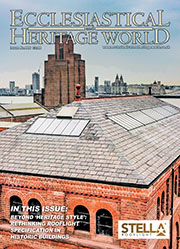IHBC welcomes ABBE’s high-level vocational qualification in conservation: ‘NVQ Level 6’
 IHBC Education Secretary David McDonald said: ‘It’s wonderful to be able to see this critical partnership initiative – commenced under my predecessor as IHBC Education Secretary, John Preston – come to fruition at last.
IHBC Education Secretary David McDonald said: ‘It’s wonderful to be able to see this critical partnership initiative – commenced under my predecessor as IHBC Education Secretary, John Preston – come to fruition at last.
Having secured occupational standards for built and historic conservation specialists last year, as well as a technical level vocational qualification (Level 3), we now have a high-level cross-professional conservation vocational qualification on offer from a leading accreditation body, ABBE, for specialists from all built environment disciplines.’
‘This is a hugely important moment for us, as it represents how informed private and local government representatives, including the IHBC, can work together, supported by sector skills councils, to establish critical standards. The almost universal adoption of the international standard for conservation, represented by the 1993 ICOMOS guidelines, has made this challenging objective much easier of course, and now that we have a vocational qualification infrastructure for conservation, we hope to see that standard more widely supported in traditional heritage circles both inside and outside government.’
Paul Butler, IHBC Membership Secretary said: ‘We are especially delighted that the new high-level NVQ structures map to the IHBC’s internal membership criteria as well as the international conservation standards that underpin it. Though like any training and education programmes, people always have to prove that they have achieved the right skills as part of their membership application, there’s no doubting the capacity of ABBE’s Level 6 conservation NVQ to underpin successful IHBC applications in the future.’
‘And as there is also a technical conservation qualification available through the ABBE Level 3 NVQ, launched last September, there’s now a whole new route open to those in early careers in the built environment to develop conservation specialisms, regardless of their primary discipline.’
Seán O’Reilly said: ‘We’re delighted that ABBE, established as it is in the mainstream built environment industry, is offering these specialist, high level qualifications. This demonstrates again the breadth of interest in heritage that the IHBC has helped cultivate and shape, and through that the care of our historic and built environment as a whole.’
‘And this is only the start! We also look forward to the further dissemination and extension of the conservation NVQ opportunities arising from our recent work with CITB-CSkills. Of course we will also keep members and others up to date through our NewsBlog, our Schools and our digital social networks.’
Sarah Dunkerley of ABBE said: ‘ABBE is delighted to announce that we have introduced a new suite of qualifications in the areas of Conservation and Conservation Technical Support. The qualifications are intended to provide a nationally recognised qualification for individuals who are employed in the conservation sector. The first ABBE assessment centres have now been approved to offer these qualifications.’
ABBE writes of the qualifications:
These qualifications have been designed for people working in the field of Conservation (in a variety of support roles at Level 3 or supervisory/management roles at Level 6). This may involve dealing with a variety of tasks whether submitting or assessing applications, or advising on and organising projects. Those suitable to undertake these qualifications may be working for local authorities and other public organisations, or as approved inspectors working in private sector consultancies. These qualifications provide a means of recognising the competence of members of the conservation sector.
Progression:
These qualifications have been designed to encourage participation in education and training in other related areas by:
- Encouraging individuals to develop skills and enhance development and promotion prospects
- Enabling existing individuals who work in the field of built environment development and control to gain a recognised qualification and enhance their depth and breadth of knowledge
- Providing a route for new entrants into the industry to develop a discipline focused qualification which can provide the foundation for enhanced learning and development
- Attracting learners from outside the industry
- Allowing individuals with qualifications in other fields to retrain in this discipline













